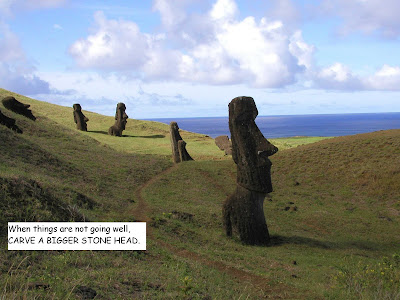Tim commented on a previous post referring to an argument from CS Lewis, paraphrased as ‘This “unfair advantage” view has always seemed to me like a drowning man refusing to be rescued by the man with the lifebelt around him because, he says, “It’s not fair – the lifebelt gives you an unfair advantage”.’ I have a suspicion that, for once, CS Lewis isn’t entirely orthodox.
As I understand it, it’s essential to Christianity that Jesus not have a biological distinction from the rest of humanity. In part that is because of the ‘what he has not assumed he has not healed’ point about salvation, but it is also because we are expected to follow in his footsteps. What is the point of being taught to do something that it is not possible to do? And wouldn’t it be cruel to have such an expectation laid upon us?
Thing is, Jesus is the pioneer and perfecter of our faith (Heb 12.2) and the first-born of many brethren (Rom 8.29) and we are expected to do greater things than Christ (John 14.12). What prevents us from doing such things is our sin; if we receive grace through faith then that obstacle is overcome and we are liberated to do ‘all the good works that thou hast prepared for us to walk in’. In other words there is no biological or innate physical obstacle preventing us from becoming like Christ; the obstacle is our sin, and that is the principal distinction between Christ and the rest of us, that he was like us in every way except that he was without sin (Heb 2.17, 4.15). So at best the lifebelt image refers to our faith, not to our actions; at worst it is dependent on a faulty understanding of discipleship.
Tim and Paul also castigated me for not spending more time on exegesis. I think this is a mistake. There is a big issue here, and some smaller issues. I’m going to intercut Tim and Paul’s words with some of mine (in italics) as we go through, before digging out what I think is the main difference. Tim first:
The question is not whether it is possible for God to do or not to do something, but whether in fact he has chosen to do or not to do the thing in question. I agree with this.
What you need to do, Sam, as I keep on saying, is to do some exegesis for us of the passages in Matthew and Luke which describe the virginal conception of Jesus, showing us why they do not in fact mean what the church has always assumed they meant. I’m not sure it’s possible to do this; more crucially I’m not sure it’s important to do so. There are two questions: a) do Matthew and Luke describe a virginal conception, b) what did Matthew and Luke understand by that? On a) I’m not sure that anyone would argue that they are not describing a virginal conception (I certainly wouldn’t), but on b) we get stuck into questions of biblical criticism, in other words, can we take Matthew and Luke to be describing something that we would call ‘a matter of fact’ or are they being theologically creative (which to my mind doesn’t rule out divine inspiration) and describing something consistent with their overall understanding of the incarnation? If the latter is true – and, despite going against Tom Wright for once, that is what I believe – then the question that I want to explore is ‘does their story still achieve what they wanted it to achieve?’ – because the whole point of my argument is that as a culture changes a story can end up meaning something rather different to what it originally meant.
And I’m sorry, but all this stuff about it being a late doctrine that is only found in a couple of places does not qualify as biblical exegesis. Agreed; the point is that it is comparatively minor.
After all, one could argue that St. John’s doctrine of Jesus as the Word is also a late doctrine only found in – well, one place I would add Colossians to this – but orthodox Christianity has made that the centre of its theology of the incarnation. And rightly so – for it makes explicit what is elsewhere implicit; it’s a necessary doctrine, it’s not at all marginal.
The Eucharist is rarely mentioned in the New Testament, but we have made it the centre of our worship. Er… every gospel plus Paul? I’m not sure how you get ‘rarely’ from that, most especially given the dramatic focus upon it – plus vast reams of supporting evidence from other scriptures and archaeological investigations. But this is a side-issue.
Paul:
I, too, would value you doing some exegetical work about Luke and Matthew’s writing. Whilst interesting, and true enough, to conjecture about the place of body-dysphoria in the neo-Platonic muddle in much of Christianity, it is, as Tim says, NOT THE POINT of relevance to the orthodoxy or otherwise of the doctrine.
I’m not sure I agree with this. Orthodoxy for me isn’t simply a matter of matching up with what the early church believed; it’s a belief that the early church correctly articulated a truth which was independent of them. To be orthodox, then, is to be in tune with that higher truth (= the living Christ). My argument is that, because of a change in the wider culture, what had previously functioned as orthodoxy (ie a transparency to the higher truth) has now become toxic (opaque to the higher truth). In other words, the church can agree on something and still be wrong (which is a remarkably Protestant principle for me to be advocating, especially with you two!)
The statement of the doctrine at the heart of the Nicene Creed places its importance way ahead of the concerns of either Aquinas or Augustine – both of whom, by the way, could be easily and consistently read as body-haters, in spite of holding to the ‘old orthodoxy’ you assert. Yes – but being placed in the creed is a different form of authority than being placed in Scripture.
What Luke and Matthew meant, what kind of thing they were writing, and writing about, is at the heart of this – not Thomist or Augustinian theology and philosophy. Again, I’m not sure I agree with you, because my argument is about what the church has understood the doctrine to mean (and I was taking Aquinas as a representative of church tradition – which he remains for the majority of Christians). But I’ll come back to this.
Tim again:
Sam, you can’t have it both ways. A couple of exchanges ago you said that you didn’t think it was possible to figure out exactly what Matthew and Luke meant by their belief in the virginal conception. Now you say that it’s no longer possible to believe the same thing they believed. How can it be no longer possible if you don’t know what they believed? The difference between certainty and probability. I don’t think it’s possible to be certain of what was in Luke’s and Matthew’s minds, but I think we can have some indications. One of which is the point about Luke being a gentile doctor, which I mentioned in the comments, and which had never occurred to me before. That means he would almost certainly have had the Aristotelean understanding of the processes of conception.
But if we’re going to go the creedal route (and I’m not backing off for a moment on my request for you to do some biblical exegesis to back up your viewpoint) then look – the creators of Chalcedonian Christology obviously believed in both the full humanity of Jesus and the Virgin Birth. Yes.
So the little problem you are raising – about how Jesus could be fully human if he wasn’t formed in a fully human way – had obviously occurred to them too, no? It was at the centre of all the creedal discussions.
Surely you don’t think that the entire Christian world has been waiting with bated breath for twenty centuries for scholars of the last generation to notice this difficulty? No, I think the problem (as I have articulated it) is a consequence of the revolution in our understanding of conception, and was literally inconceivable(!) prior to that. The concerns I am raising simply don’t exist if you accept Aristotle’s understanding. What has happened in the West is that the doctrine of the virgin birth – and of incarnation – has been rejected as ‘superstition’, as a result of the more general scientific revolution, and I don’t think there have been many people (though I’m hopeful I’m not the first) who have argued from this perspective. I’m wanting to disentangle incarnation from virgin birth, in order to jettison the latter (a literal belief in the latter) as something which was once helpful but is now damaging. It’s a bit like the booster stage of the space shuttle launch – if you hang on to it for too long it gets in the way.
Personally I don’t think you can ever get away from the paradox. We say that Jesus was fully human, a man like us, but we know full well that in many ways he was not a man like us. First, we’ve never experienced sinless humanity before. How does that play itself out when it comes to involvement in social sins? Jesus paid taxes, therefore he was embedded in the matrix of social sin that taxation represents, eg paying the salaries of the Roman legionnaires occupying Jerusalem. I’m not sure that inhibits his divinity (though that might be worth discussing).
How does it relate to childhood temper tantrums? Quite frankly, a lot of the problems I go through on a daily basis are a result of my own sinfulness – and in this, Jesus is not a man like me and cannot sympathise with my weakness. And his consciousness of the Father’s presence, his awareness of himself as the Son of God, his miracles etc. etc. – all serve to distance his experience from my experience. Ah. I’m totally with you on sin being what separates us from Jesus – but sin alone. On things like the Father’s presence, the ability to perform ‘miracles’ and so on – I see no barrier to us doing what he did. (This is what I feel called to explore through the charismatic stuff by the way)
Shared our humanity to the full – yes indeed, but let’s not pretend that his humanity was not impacted in any way by his divinity. The problem you raise seems to me to be just one instance of the tensions we face in holding to the paradox of both our Lord’s humanity and also his divinity. Hmm. I think you’re placing his humanity and divinity on the same playing field, as if they are contesting the same space. I don’t understand it like that.
On another subject, Luke may have been a Gentile writing for a Gentile audience, but in some ways he is as Jewish as Matthew – especially, funnily enough, in his birth and infancy narratives with their conscious placing of Jesus in the stream of OT salvation history. But surely, as Tom Wright points out, Luke and Matthew must have known the risk they were taking in telling the story of a virginal conception in the context of the Greek and Roman myths that their Gentile audiences (and Jewish too, no doubt) would have been aware of. Why would they take that risk, if they didn’t think the truth of the historical record was at stake? Well, it might be to do with slander about Jesus’ paternity; but as you say – they are consciously telling the story with a theological aim, which is one of the reasons why the historicity of the two stories is suspect.
Midrash? Well I remember NT Wright’s criticism of John Shelby Spong at this point – I believe it was in the book ‘Who Was Jesus?’ (it’s at the office and I’m at home!) – in which he asked how much midrash Spong had actually read or read about. I remember Wright answering just the point you are advancing, quoting from a Jewish scholar who claimed that the nativity stories are nothing like traditional midrash. But I can’t claim to have studied this, so must leave it to you real scholars! I’m in the same boat – although I will look up Wright in that book and in his book co-authored with Borg. I’ll put the two links here that I mentioned in the comments, Doug here (also here which outlines theology I really like, and here), and also this post with more detail on the inconsistencies in the two accounts.
What is becoming clear to me, however, is that behind these disagreements lies the disagreement about the status of Scripture as such. In other words, as Paul argued, “What Luke and Matthew meant, what kind of thing they were writing, and writing about, is at the heart of this – not Thomist or Augustinian theology and philosophy.” This assumes at least two things, it seems to me, neither of which I actually agree with. Firstly, it puts Scripture as the highest authority, through which tradition and reason have to travel in order to reach Christ (I think that is the historic Anglican position by the way, so I think Tim’s recent disagreement with me on it is justified). Second, however, is the disjunction that is implied between ‘theology and philosophy’ and ‘Scripture’ which I don’t think is supportable (and this is why I think that in the end the two of you are both Protestants and I’m not! 😉 )
For what is at stake in disagreeing over this? There is agreement over things like incarnation, resurrection, Trinity, salvation etc – all those things which I see as the major doctrines. What seems to be at stake is whether Scripture is not giving us the literal truth in this story. I want to argue that this story is to be understood symbolically in the context of contemporary beliefs – and for the underlying point to be affirmed. You two seem to be arguing that ‘what Scripture says’ is the be-all and end-all. As it happens I really liked Tim’s point that “if they believed that the virginal conception had actually happened (and I would contend that they did – along with C.S. Lewis, N.T. Wright, and the vast majority of the Christian tradition), then you have to start with the historicity of the event and ask what consequences it has for your theology and philosophy, rather than starting with your theology and philosophy, saying ‘This doesn’t make sense’, and then modifying the record to fit your conclusion.” I do think that’s a really strong point, it’s just not strong enough for me in this case. Which is a different way of saying: I give weight to the doctrinal consistency and benefit flowing from particular beliefs; it matters what we believe and, in the end, I just don’t see this as being true, in a weight-bearing and life-giving sense. And because I don’t place Scripture above the other elements, I’m happy to say either a) Scripture is mistaken, or b) these passages are not to be interpreted in a literal fashion.
Which – rather depressingly – makes me a raving liberal. Ho hum.
(Then again, virtually nobody takes everything in the bible to be literally true. See here with a H/T to Michael for pointing me in his direction).






